Fitzharry Surname Ancestry ResultsOur indexes 1000-1999 include entries for the spelling 'fitzharry'. In the period you have requested, we have the following 18 records (displaying 1 to 10): Buy all | | | Get all 18 records to view, to save and print for £86.00 |
These sample scans are from the original record. You will get scans of the full pages or articles where the surname you searched for has been found. Your web browser may prevent the sample windows from opening; in this case please change your browser settings to allow pop-up windows from this site. Grantees of offices, commissions and pardons
(1413-1416)
The Patent Rolls are the Chancery enrolments of royal letters patent. Those for the 1st, 2nd and 3rd years of the reign of king Henry V (21 March 1413 to 20 March 1416) were edited for the Public Record Office by R. C. Fowler, and published in 1910. The main contents are royal commissions and grants; ratifications of ecclesiastical estates; writs of aid to royal servants and purveyors; and pardons. The commissions of the peace issued for the English towns and counties and entered on the rolls, being largely repetitive, have been consolidated in a single appendix.FITZHARRY. Cost: £2.00.  | Sample scan, click to enlarge

| Norman Rolls
(1200-1417)
The dukedom of Normandy is one of the appendages of the English crown, but actual possession of the dukedom was actively contested by the kings of France. During the periods of English power records were kept for Normandy similar to those of the royal administration in England, with enrolment of letters and grants of liberties and privileges and confirmations of previous enjoyed rights. The rolls for 1200 to 1205 and during the reassertion of English rule under Henry V in 1417, were edited by Thomas Duffus Hardy for the Commissioners of the Public Records, and published in 1835. Most of the persons mentioned are French inhabitants of Normandy or Englishmen in France, but there is also a long section (from page 122 onwards) of valuation of lands of Normans in England, where English jurors, county by English county, attest to acreage, numbers of cattle &c.FITZHARRY. Cost: £4.00.  | Sample scan, click to enlarge

| The English in France
(1422)
King Henry VI of England (one of the grandsons of Charles VI of France) claimed the throne of France (and quartered the fleurs-de-lis of France with the lions of England on the royal standard) as had his predecessors since Edward III, as descendants of Philip IV of France. The English had real power or influence in Brittany, Normandy, Flanders and Gascony, and actual possession of several coastal garrisons, in particular Calais, where the French inhabitants had been replaced by English. Henry VI came to the throne only seven years after his father had trounced the French at Agincourt; but his cousin, Charles VII, who became king of France in the same year, spent his long reign rebutting the English king's claim to his throne by territorial reconquest and consolidation. The English administration kept a series of records called the French Rolls. On these are recorded royal appointments and commissions in France; letters of protection and safe-conduct to soldiers, merchants, diplomats and pilgrims travelling to France from England and returning, and to foreign legations. There are also licences to merchants to export to the Continent, and to captains to transport pilgrims. As Henry VI's reign progressed, and the English grip on northern France loosened, the French Rolls also increasingly include entries concerning the ransoming of English prisoners.FITZHARRY. Cost: £6.00.  | Sample scan, click to enlarge
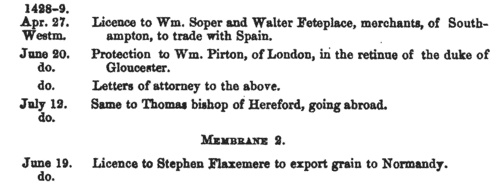
| The English in France
(1423)
King Henry VI of England (one of the grandsons of Charles VI of France) claimed the throne of France (and quartered the fleurs-de-lis of France with the lions of England on the royal standard) as had his predecessors since Edward III, as descendants of Philip IV of France. The English had real power or influence in Brittany, Normandy, Flanders and Gascony, and actual possession of several coastal garrisons, in particular Calais, where the French inhabitants had been replaced by English. Henry VI came to the throne only seven years after his father had trounced the French at Agincourt; but his cousin, Charles VII, who became king of France in the same year, spent his long reign rebutting the English king's claim to his throne by territorial reconquest and consolidation. The English administration kept a series of records called the French Rolls. On these are recorded royal appointments and commissions in France; letters of protection and safe-conduct to soldiers, merchants, diplomats and pilgrims travelling to France from England and returning, and to foreign legations. There are also licences to merchants to export to the Continent, and to captains to transport pilgrims. As Henry VI's reign progressed, and the English grip on northern France loosened, the French Rolls also increasingly include entries concerning the ransoming of English prisoners.FITZHARRY. Cost: £6.00.  | Sample scan, click to enlarge
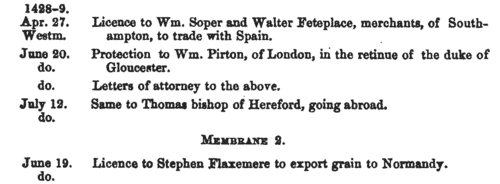
| The English in France
(1428)
King Henry VI of England (one of the grandsons of Charles VI of France) claimed the throne of France (and quartered the fleurs-de-lis of France with the lions of England on the royal standard) as had his predecessors since Edward III, as descendants of Philip IV of France. The English had real power or influence in Brittany, Normandy, Flanders and Gascony, and actual possession of several coastal garrisons, in particular Calais, where the French inhabitants had been replaced by English. Henry VI came to the throne only seven years after his father had trounced the French at Agincourt; but his cousin, Charles VII, who became king of France in the same year, spent his long reign rebutting the English king's claim to his throne by territorial reconquest and consolidation. The English administration kept a series of records called the French Rolls. On these are recorded royal appointments and commissions in France; letters of protection and safe-conduct to soldiers, merchants, diplomats and pilgrims travelling to France from England and returning, and to foreign legations. There are also licences to merchants to export to the Continent, and to captains to transport pilgrims. As Henry VI's reign progressed, and the English grip on northern France loosened, the French Rolls also increasingly include entries concerning the ransoming of English prisoners.FITZHARRY. Cost: £6.00.  | Sample scan, click to enlarge
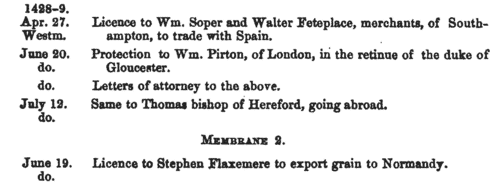
| The English in France
(1429)
King Henry VI of England (one of the grandsons of Charles VI of France) claimed the throne of France (and quartered the fleurs-de-lis of France with the lions of England on the royal standard) as had his predecessors since Edward III, as descendants of Philip IV of France. The English had real power or influence in Brittany, Normandy, Flanders and Gascony, and actual possession of several coastal garrisons, in particular Calais, where the French inhabitants had been replaced by English. Henry VI came to the throne only seven years after his father had trounced the French at Agincourt; but his cousin, Charles VII, who became king of France in the same year, spent his long reign rebutting the English king's claim to his throne by territorial reconquest and consolidation. The English administration kept a series of records called the French Rolls. On these are recorded royal appointments and commissions in France; letters of protection and safe-conduct to soldiers, merchants, diplomats and pilgrims travelling to France from England and returning, and to foreign legations. There are also licences to merchants to export to the Continent, and to captains to transport pilgrims. As Henry VI's reign progressed, and the English grip on northern France loosened, the French Rolls also increasingly include entries concerning the ransoming of English prisoners.FITZHARRY. Cost: £6.00.  | Sample scan, click to enlarge
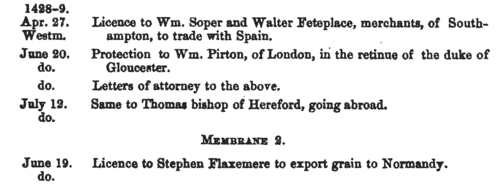
| The English in France
(1431)
King Henry VI of England (one of the grandsons of Charles VI of France) claimed the throne of France (and quartered the fleurs-de-lis of France with the lions of England on the royal standard) as had his predecessors since Edward III, as descendants of Philip IV of France. The English had real power or influence in Brittany, Normandy, Flanders and Gascony, and actual possession of several coastal garrisons, in particular Calais, where the French inhabitants had been replaced by English. Henry VI came to the throne only seven years after his father had trounced the French at Agincourt; but his cousin, Charles VII, who became king of France in the same year, spent his long reign rebutting the English king's claim to his throne by territorial reconquest and consolidation. The English administration kept a series of records called the French Rolls. On these are recorded royal appointments and commissions in France; letters of protection and safe-conduct to soldiers, merchants, diplomats and pilgrims travelling to France from England and returning, and to foreign legations. There are also licences to merchants to export to the Continent, and to captains to transport pilgrims. As Henry VI's reign progressed, and the English grip on northern France loosened, the French Rolls also increasingly include entries concerning the ransoming of English prisoners.FITZHARRY. Cost: £6.00.  | Sample scan, click to enlarge
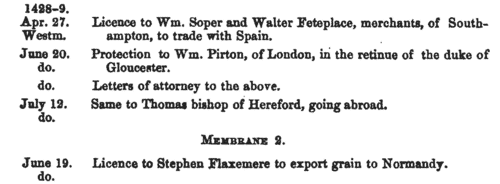
| Clergy, the religious and the faithful in Britain and Ireland
(1471-1484)
These are abstracts of the entries relating to Great Britain and Ireland from the Lateran and Vatican Regesta of pope Sixtus IV. Many of these entries relate to clerical appointments and disputes, but there are also indults to devout laymen and women for portable altars, remission of sins, &c. This source is particularly valuable for Ireland, for which many of the key government records of this period are lost. Many of the names in the text were clearly a puzzle to the scribes in Rome, and spelling of British and Irish placenames and surnames is chaotic. Sixtus IV was consecrated and crowned 25 August 1471 (the day from which his pontificate is dated) and died at Rome 12 August 1484. The extracts were made by J. A. Twemlow from Vatican Regesta dxlvi to dclxxxi and Lateran Regesta dccxiii to dcccxxxviii, and published in 1955. Not all the Lateran registers survive from this pontificate, but were still in existence in the 18th century, when indexes were compiled giving rubricelle, or brief summaries of the papal bulls; nor, indeed, have all these indexes now survived, but Twemlow added an appendix listing all the rubricelle relating to the British Isles extant for the reign of Sixtus IV.FITZHARRY. Cost: £4.00.  | Sample scan, click to enlarge

| Treasury Books
(1698-1699)
Records of the Treasury administration in Britain, America and the colonies, from September 1698 to July 1699. These also include records of the appointment and replacement of customs officers such as tide waiters and surveyors.FITZHARRY. Cost: £4.00.  | Sample scan, click to enlarge

| Treasury Books
(1700-1701)
Records of the Treasury administration in Britain, America and the colonies, from October 1700 to December 1701.
FITZHARRY. Cost: £4.00.  | Sample scan, click to enlarge
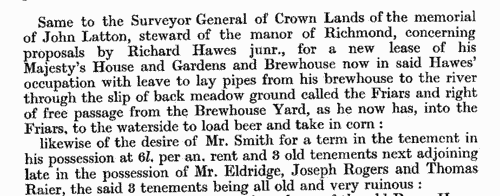
|
| 1 | 2 |  |
Research your ancestry, family history, genealogy and one-name study by direct access to original records and archives indexed by surname.
|












